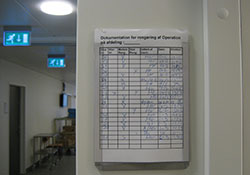Country work

WHO
Through Biennial Collaborative Agreements (BCAs), WHO/Europe supports various activities in the field of patient safety and quality of care. Recent examples are summarized below.
Exploring integrated reporting in Czech, Slovakia, Slovenia, Poland
This work has been covered by successive biennial collaborative agreements, with a particular focus on patient safety centred care. The role of reporting and learning processes and the need to change medical culture and educate patients to co-share responsibility for their own health status were seen as key issues in improving quality and safety of care. The experience of existing safe management systems is expected to involve further expansion of dedicated national networks.
National adaptation and scale up of safe surgery checklist in Poland (with WHOCC Krakow)
Building on previous work of translation and adaptation of the generic safe surgery checklist, work moved one step further to its detailed application in five medical specialties: cardio-surgery; orthopaedics, ophthalmology; children surgery and neurosurgery. The safe surgery checklists subsequently finalized were recommended for national scale up in December 2013.
Clean care event in the former Yugoslav Republic of Macedonia
A technical meeting was organized by WHO Country office in cooperation with the Ministry of Health, the Medical Faculty, and NGO Studiorum on May 5, with the participation of 53 representatives from hospitals, Public Health Centres and Clinics from the country, and 30 media houses involved. The developed materials (posters, leaflets on hand hygiene and plastic pagers in local language) have been widely distributed and information published on the web pages of the MoH, National Public Health Institute and NGO studiorum and medical associations across the country.
MIMPS piloting
The European validation of Minimal Information Model for Patient Safety Incident Reporting has started in May 2014. The country-driven project led by WHO Headquarters and covered by a WHO and EU agreement, builds on existing experience and practices of incident reporting in Europe. The 15 pilot sites enrolled participate in the validation of the MIM interface as a tool for meaningful reporting, usability and acceptability. Project development will follow 5 steps, closing with a final review and consensus building conference in 2015.
Patient participation
Work on activation of the health literate patient in the process of disease prevention and care is being planned with the support of the WHO Patients for patient safety strand of work, the WHO Collaborating Centre for quality of care Krakow and the Polish Patients association.



